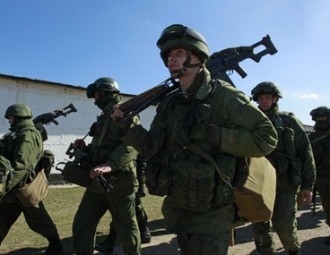Andrei Yahorau: This is a new stage of war in Ukraine

If the facts that Russian army invaded Ukraine are confirmed, the international community will be obliged to firmly oppose Russia.
Kiev has officially announced that the Russian army invaded the territory of Ukraine. In this relation Ukrainian President Petro Poroshenko cancelled his visit to Turkey and urgently summoned a meeting of the Council for National Security and Defense “in relation to the steep aggravation of the situation in Donetsk region”. Simultaneously with that Ukrainian PM Arseny Yatsenyuk called for summoning an urgent summit of the UN Security Council.
Russian officials traditionally reject the fact of intervention into Ukraine. “EuroBelarus” Information Service asked Andrei Yahorau, the head of the Centre for European Transformation, to comment on the situation.
- What is happening in Ukraine? Is it an intervention?
- Yes, Russia’s regular army invaded Ukraine. Judging by the words of the Ukrainian officials that were partially confirmed by the EU and the US representatives, Russian army intruded Ukrainian territory and occupied several towns. De jure we don’t have factual confirmations that the Russian army is acting at the east of Ukraine, but the situation remains the same for quite the long time. Occupation of Crimea, support of gunmen, and humanitarian convoy – all these facts de facto demonstrate that Russia is at war with Ukraine. And this is just a new stage of the war, when regular army is getting involved in it.
- Can we assume that Russia will use the scenario of introducing “little green men” to Ukraine (i.e. Russian soldiers without identification marks)?
- I think this is what is happening now. Identification marks of the Russian army on armored vehicles were painted out and removed from the uniform. And what is now happening at the east of Ukraine hardly differs from the situation in Crimea.
- What reaction to the introduction of Russian army into Ukraine should we expect from the international community?
- Let’s see. Ukraine called for summoning the UN Security Council, Switzerland suggested summoning an emergency meeting of the OSCE. And before these meetings start, EU leaders are making some statements, but they still are very amorphous and careful.
- But can we expect more rigid reaction from the international structures?
- Indeed, we can. If the facts of intervention are confirmed, and Ukraine is able to submit convincing evidence that it is Russian army that is acting at the east of Ukraine, then the reaction of the international community should be decisive and rigid; otherwise it would be impossible to stop Russia. Russia should realize that such actions should get the most decisive repulse from the international community. The question is whether the international community is ready for such reaction.
-
03.01
-
07.10
-
22.09
-
17.08
-
12.08
-
30.09








































